Paleoflora of the Eocene Okanagan Highlands
The paleoflora of the Eocene Okanagan Highlands includes all plant and fungi fossils preserved in the Eocene Okanagan Highlands Lagerstätten. The highlands are a series of Early Eocene geological formations which span an 1,000 km (620 mi) transect of British Columbia, Canada and Washington state, United States and are known for the diverse and detailed plant fossils which represent an upland temperate ecosystem immediately after the Paleocene-Eocene thermal maximum, and before the increased cooling of the middle and late Eocene to Oligocene. The fossiliferous deposits of the region were noted as early as 1873, with small amounts of systematic work happening in the 1880-90s on British Columbian sites, and 1920-30s for Washington sites. A returned focus and more detailed descriptive work on the Okanagan Highlands sites revived in the 1970s. The noted richness of agricultural plant families in Republic and Princeton floras resulted in the term "Eocene orchards" being used for the paleofloras.
Paleoflora
[edit]The Eocene Okanagan Highlands hosted a diverse mix of temperate and tropical paleobiotic elements,[1] with the forests having the first significant proportions of temperate plants in North America.[2] The paleobotanical community was a mixture of plants found in subtropical evergreen and temperate deciduous forests.[1] Included in the forest were a number of important modern temperate flowering plant families such as Betulaceae, Rosaceae, and Sapindaceae, plus the conifer family Pinaceae. Study of the deciduous plants from the highlands has documented the occurrence of heteromorphic leaves derived from sun versus shade conditions and long shoot or short shoot buds.[2] The paleobotanical community of the Republic area has been noted as the most diverse floral community of the Okanagan highlands, with some estimates ranging to over 68 families and 134 genera being present.[3] The noted richness of Rosaceae fossils along with other important agricultural plant families found in the Republic and Princeton floras, including the genera that contain modern apples, blackberries, cherries, and serviceberries resulted in Wes Wher and Donald Hopkins (1994) coining the term "Eocene orchards".[4][5] Fossil evidence from both Sorbus/Crataegus and Rhus leaves in the Republic sites indicate the area was a center for species overlap and active hybridization events.[2]
Extent
[edit]The majority of the lake deposits are compression fossils in lake bed sediments grouped informally into "Northern", "Central", and "Southern" sites.[6] The Northern sites are composed of unnamed Ootsa Group formations which outcrop as the "Driftwood shales" near Smithers, British Columbia, sites now considered lost in the Quesnel, British Columbia area,[7] and the "Horsefly shales", of an unnamed formation and unnamed group which outcrop around Horsefly, British Columbia.[6] The Central sites represent Kamloops Group formations with the McAbee Fossil Beds, Tranquille River site and Falkland site, all in the Tranquille Formation, the Quichena site and Stump Lake site in the Coldwater Beds and outcrops of the Chu Chua Formation near Barriere, British Columbia. The Southern sites include the Princeton Group Allenby Formation sites surrounding Princeton, British Columbia, such as "Nine Mile Creek", "One Mile Creek", "Pleasant Valley", "Thomas Ranch", "Vermilian Bluffs", and "Whipsaw Creek". The most southerly of the Okanagan Highlands lakes, the Klondike Mountain Formation in Northern Ferry County, Washington include the "Boot Hill", "Corner Lot", "Gold Mountain", "Knob Hill", and "Mount Elizabeth" localities.[6] Closely correlated with the Klondike Mountain Formation are the Penticton groups Kettle River, Marama and Marron Formations in the Boundary District along the Canada-United States border.[8]
There is debate as to the affiliation of the, now lost, Quesnel outcrops with the Greater Okanagan Highlands. Archibald et al. (2018) in the monograph overview of the Highlands Hymenoptera included them as part of the series. However the certainty for the placement was later questioned by Archibald and Cannings (2022) who opted to tentatively exclude Quesnel from the highlands while discussing the history of field collecting in the region.[7]
Chert and amber
[edit]
Additionally two important non-compression biotas are present in the Eocene Okanagan Highlands. A permineralized chert flora, the Princeton Chert is found along the Similkameen River interbedded with coal deposits of the Ashnola shale unit, Allenby Formation known for anatomically preserved plants.[9] In the Central sites, subbituminous coal of the Hat Creek Coal Formation around Hat Creek hosts an amber biota, the Hat Creek amber which preserves many small insects and plant fragments that would likely not be found in the compression biotas.[10][11]
Diatoms
[edit]Two algae taxa of the protist order Ochrophyta have been described from the highlands, and are placed in the family Aulacoseiraceae, a member of the diatom order Bacillariophyceae,.[12] The third algae is identified as a living paleoendemic Mallomonas species now restricted to warmer climates in North America and Europe.[13]
| Family | Genus | species | Sites | Notes | Images |
|---|---|---|---|---|---|
| Aulacoseiraceae |
|
An aulacoseiraceous diatom |
|||
|
|||||
|
An mallomonadaceous synurid algae |
Bryophytes
[edit]A group of six mosses were described from the Allenby Formation by Kuc (1972,1974) representing the genera Ditrichites, Hypnites and Plagiopodopsis , with two species placed in the morphogenus Muscites .[15][16] Further revision of the fossils was conducted by Milner (1980), who placed two species into the genus Plagiopodopsis and moved both species described as Palaeohypnum to other genera.[17] One further moss has been described from Horsefly, and placed in the living genus Aulacomnium by Janssens et al (1979).[18] Dillhoff et al. (2013) reference undescribed moss specimens from the Klondike Mountain Formation known from vegetative gametophytes,[19] and George Poinar, Jr. et al. (1999) illustrated an undescribed specimen of moss entombed in Hat Creek Amber.[10]
| Family | Genus | species | Sites | Notes | Images |
|---|---|---|---|---|---|
| Amblystegiaceae | †Hypnites |
|
An amblystegiaceous moss, |
||
|
An amblystegiaceous moss |
||||
|
|||||
|
A bartramiaceous moss |
||||
|
|||||
| Incertae sedis | †Muscites |
|
A moss of uncertain placement |
||
|
A moss of uncertain placement |
||||
| Undescribed | Undescribed |
|
Undescribed moss compression specimens |
 | |
|
Undescribed[10] |
|
Undescribed moss amber specimens |
Lycophytes
[edit]Both an undescribed member of the fossil quillwort genus Isoetites[22] and the spikemoss genus Selaginella[23] have been found in the Klondike Mountain Formation, while an additional fossil deemed Cf. Selaginella was later reported from the Allenby Formation.[19]
| Family | Genus | species | Sites | Notes | Images |
|---|---|---|---|---|---|
|
Undescribed[22] |
|
A quillwort relative |
 | ||
| Selaginellaceae |
Undescribed[23] |
|
A spikemoss |
 | |
|
Undescribed[19] |
|
A spikemoss from the Thomas Ranch site. |
Pteridophytes
[edit]Five species of ferns and fern relatives have been described from the compression biotas and an additional four compression taxa that have been tentatively identified to family or genus. A series of four additional ferns have been described from premineralized specimens in the Princeton Chert and a fifth taxon is identified to genus. Several fern specimens were briefly mentioned from Horsefly but no taxonomic assignment was made due to lack of reproductive vegetation.[20]
| Family | Genus | species | Sites | Notes | Images |
|---|---|---|---|---|---|
| Athyriaceae |
|
||||
|
|||||
| Blechnaceae |
|
||||
|
A blechnacious fern |
||||
|
Undescribed[23] |
|
A possible bladder fern relative. |
|||
| Dennstaedtiaceae |
|
A Hayscented fern |
 | ||
|
|||||
| Equisetaceae |
|
A scouring rush |
 | ||
|
A scouring rush. |
 Not described | |||
|
|||||
|
Undescribed[23] |
|
A climbing fern. |
|||
|
An osmundaceous fern |
||||
|
(?)Adiantum |
Undescribed[21] |
|
A possible maidenhair fern |
||
| Salviniaceae | Azolla |
|
A mosquito fern, |
 | |
|
A mosquito fern, |
||||
|
Undescribed[27] |
|
A "watermoss" species. |
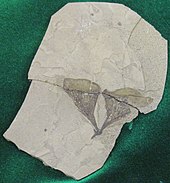 not described | ||
|
Unidentified[40] |
|
A northern beech fern species. |
 |
Gymnosperms
[edit]Three major groups of gymnosperms are present in the Okanagan Highlands formations, with the most speciose being the pinophytes. The ginkgophytes are represented by two species of Ginkgo, while an undescribed Zamiaceae member is the sole cycadophyte.
Cycadophytes
[edit]| Family | Genus | species | Sites | Notes | Images |
|---|---|---|---|---|---|
|
Undescribed |
|
A zamiaceous cycad. |
 |
Gingkophytes
[edit]| Family | Genus | Species | Sites | Notes | Images |
|---|---|---|---|---|---|
| Ginkgoaceae | Ginkgo |
|
A ginkgo, |
 | |
|
A ginkgo |
 | |||
|
A ginkgo |
Conifers
[edit]Cupressaceae
[edit]| Family | Genus | Species | Sites | Notes | Images |
|---|---|---|---|---|---|
|
Undescribed[42] |
|
A Cunninghamia |
 | ||
| Cupressoideae |
|
An incense cedar |
|||
|
A false cypress |
||||
| †Cupressinocladus |
|
A Cupressoid foliage morphotaxon. |
|||
|
Undescribed[45] |
|
A Cupressoid foliage morphotaxon. |
|||
|
Undescribed[34] |
|
A juniper |
|||
|
An arborvitae |
||||
|
Undescribed[42] |
|
An incense cedar relative |
|||
|
A Hiba relative |
||||
| Sequoioideae | Metasequoia |
|
|||
|
†Metasequoia occidentalis[50][36][28][51][52][38][42][21][19] |
|
A dawn redwood
|
 | ||
|
Undescribed[39] |
|
A dawn redwood |
|||
| Sequoia |
|
A Redwood |
 | ||
|
|||||
|
Undescribed[27] |
|
A Taiwania species |
|||
| Taxodioideae |
|
A sugi |
|||
| Glyptostrobus |
|
||||
|
A Chinese swamp cypress |
 | |||
| Taxodium |
|
||||
|
A bald cypress |
||||
| Incertae sedis | †Cupressinoxylon |
|
A fossil cupressaceous? wood |
||
|
A fossil cupressaceous? wood |
Pinaceae
[edit]| Family | Genus | Species | Sites | Notes | Images |
|---|---|---|---|---|---|
| Abietoideae | Abies |
|
Oldest true fir described |
 | |
|
A fir conescale morphospecies |
||||
|
A true fir |
||||
|
Undescribed[39] |
|
A Keteleeria species |
|||
| Pseudolarix |
|
A golden larch |
|||
|
A long bracted golden larch |
 | |||
|
A golden larch |
||||
|
A hemlock |
||||
|
A Carbonized/petrified wood species |
 Radial thin section | |||
| Piceoideae | Picea |
|
A spruce cone & needle species |
 | |
|
A spruce needle species |
||||
|
A spruce needle species |
||||
|
A spruce |
||||
| Pinoideae | Pinus |
|
A 2-needled Pine |
||
|
A 3-needled Pine |
||||
|
A basal Pine, |
||||
|
A permineralized pinaceous wood, compression cone species |
 | |||
|
A permineralized pinaceous cone |
||||
|
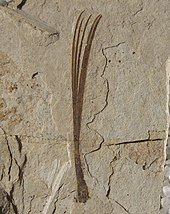 | ||||
|
A 3 needle pine, jr homoym to Pinus macrophylla Lindley 1839 |
 | |||
|
A pinaceous winged seed morphogenus |
 | |||
|
A pinaceous cone |
||||
|
A possible 4 needled pine |
 | |||
|
|||||
|
|||||
|
Pine leaves and seeds |
Sciadopityaceae
[edit]| Name | Authority | Year | Family | Notes | Images |
|---|---|---|---|---|---|
|
Undescribed[44] |
|
An umbrella pine species |
 |
Taxaceae
[edit]| Name | Authority | Year | Family | Notes | Images |
|---|---|---|---|---|---|
| Taxaceae |
|
A yew |
 | ||
|
A yew |
||||
|
A yew |
||||
|
A yew |
||||
|
Undescribed[34] |
|
A yew |
|||
|
Undescribed[34] |
|
A plum-yew |
|||
|
A plum-yew relative |
||||
|
Unidentified |
Unidentified[21] |
|
Cephalotaxaceous needles |
Angiosperms
[edit]Nymphaeales
[edit]The basal angiosperms are represented by two Nymphaeales water-lily species Nuphar carlquistii[66] from the Republic and Princeton shales, plus Allenbya collinsonae from the Princeton Chert.[67] Wehr (1995) illustrated two fossils that were tentatively identified as fruits of the banana genus Ensete and the extinct myrtle genus Paleomyrtinaea respectively,[68] however further fossil finds resulted in the re-identification of the first as a N. carlquistii rhizome section, and the second is a seed mass from the same water-lily.[66]
| Family | Genus | Species | Sites | Notes | Images |
|---|---|---|---|---|---|
| Nelumbonaceae? | †Nelumbium |
|
Possible lotus family leaves |
||
|
Unidentified[36] |
|
Fragmentary possible lotus family leaves |
|||
|
Unidentified[21] |
|
Lotus leaves |
|||
| Nymphaeaceae |
|
A waterlily relative. |
|||
|
A waterlily, |
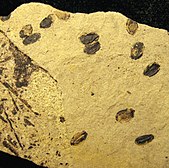 |
Magnoliids
[edit]| Family | Genus | species | Sites | Notes | Images |
|---|---|---|---|---|---|
| Lauraceae |
Undescribed[34] |
|
A spicewood species. |
||
|
Undescribed[20] |
|
A spicewood like species. |
|||
|
Undescribed[28] |
|
Tentative identification based on 2 partial specimens |
|||
|
Undescribed[23] |
|
A lauraceous form species. |
|||
|
Undescribed[23] |
|
A stinkwood species. |
|||
|
A Phoebe sp. |
||||
| Sassafras |
|
A sassafras |
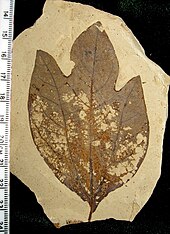 | ||
|
A sassafras species |
||||
| Unidentified |
Unidentified[21] |
|
Lauraceous leaves |
||
|
Unidentified[69] |
|
Lauraceous fruits |
|||
| Magnoliaceae |
|
A Liriodendron-like wood. |
|||
|
Magnolia leaves |
 | |||
|
A lizard's-tail species |
||||
| incertae sedis |
|
A flower of uncertain floral relationship, possibly of Magnoliid affinity |
 | ||
|
A possibly aquatic magnoliopsid |
Monocots
[edit]Pigg, Manchester, and DeVore (2023) gave brief descriptions of three monocots from Horsefly, labeling them as Monocot #1 (broad leaved), Monocot #2 (parallel veined), and Monocot #3 (parallel veined). They did not give any taxonomic possibilities for the affinities of the fossils.[20]
| Family | Genus | species | Sites | Notes | Images |
|---|---|---|---|---|---|
|
An aquatic or emergent water-plantain |
||||
|
An onion relative |
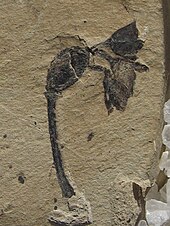 | |||
|
A Cape-pondweed pollen |
||||
| Araceae |
|
An arum family member |
|||
|
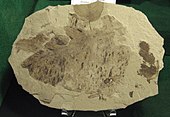 | ||||
|
|||||
|
Undescribed[36] |
|
Sedge fruits |
|||
|
Undescribed |
|
grass family leaves of uncertain nature. |
|||
|
Unidescribed[36] |
|
A possible Potamogeton species fruit. |
|||
|
Undescribed[23] |
|
A greenbrier species. |
|||
|
A cattail species. |
||||
|
A possible iridaceous pollen morphotype |
||||
| Incertae sedis |
|
A cyperaceous or juncaceous poalean monocot |
|||
|
A lilialean genus of uncertain placement |
Eudicots
[edit]"Basal eudicots"
[edit]| Family | Genus | species | Sites | Notes | Images |
|---|---|---|---|---|---|
|
Undescribed[68] |
|
A moonseed |
|||
| Platanaceae |
|
A plane tree relative fruiting head. |
|||
|
A plane tree relative. |
 | |||
|
A plane tree fruit taxon |
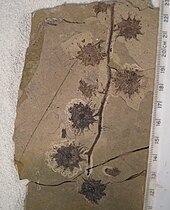 | |||
| †Macginitiea |
|
A plane tree relative. |
 | ||
|
sycamore relative leaves |
||||
|
Undescribed[86] |
|
A sycamore stamen head |
|||
|
Undescribed |
Undescribed[20] |
|
A Platanus like seed with dispersal hairs |
||
|
A Clematis |
 | |||
| Sabiaceae |
Undescribed[68] |
|
A Meliosma species |
||
|
Undescribed[68] |
|
A Sabia species |
|||
|
Undescribed[23] |
|
A kadsura species. |
|||
| Trochodendraceae |
|
A Trochodendrale |
|||
|
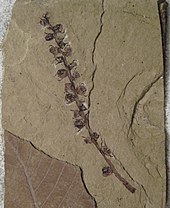 | ||||
| Tetracentron |
|
A Trochodendrale, |
 | ||
|
Unidentified[21] |
|
Tetracentron leaves |
|||
| Trochodendron |
|
A Trochodendron |
|||
|
A Trochodendron |
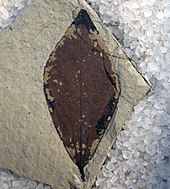 | |||
|
Unidentified[21] |
|
Trochodendron fruits |
|||
|
A trochodendroid of uncertain placement.[88] |
 | |||
|
A trochodendroid of uncertain placement.[88] |
"Superasterids"
[edit]| Family | Genus | species | Sites | Notes | Images |
|---|---|---|---|---|---|
|
Undescribed[34] |
|
A holly |
|||
| Araliaceae |
Undescribed[42] |
|
A spikenard species |
||
|
Undescribed[42] |
|
A spikenard species foliage |
|||
|
Undescribed[42] |
|
A spikenard species fruit |
|||
|
Undescribed |
Undescribed[85] |
|
A catalpa family member |
 | |
|
A dogwood species, |
||||
|
Unidentified |
|
A punitive persimmon relative. |
|||
| Ericaceae |
|
A madrone relative |
|||
|
A Rhododendron |
||||
|
A genus close to Rhododendron |
||||
|
An ericaceous leaf morphogenus |
||||
|
Undescribed[4] |
|
A doghobble relative |
|||
| Eucommiaceae | Eucommia |
|
A "hard rubber tree" fruit |
 | |
|
A "hard rubber tree" leaf |
||||
|
Undescribed[92] |
|
An Aucuba |
|||
| Hydrangeaceae |
Undescribed[4] |
|
A Hydrangea. |
||
|
Undescribed[4] |
|
A mock-orange |
|||
|
A Phytocrene relative |
||||
| Nyssaceae |
|
A tuplo relative. |
|||
|
A dove-tree relative |
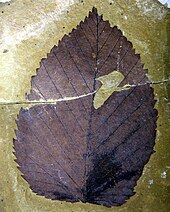 | |||
| Oleaceae | Fraxinus |
|
An ash species with notched samara apex. |
||
|
An ash species with rounded samara apex. |
||||
|
undescribed[34] |
|
A possible ash relative. |
|||
|
A possible Schoepfia relative, |
 | |||
| Theaceae |
Undescribed[21] |
|
Possible Gordonia fruits |
 | |
| †Ternstroemites |
"Species A"[52] |
|
A theaceous species similar to Gordonia |
 | |
|
A theaceous species similar to Cleyera |
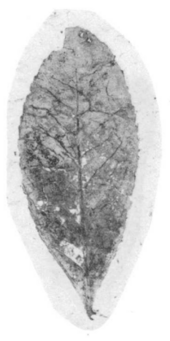 |
"Superrosids"
[edit]Fabids COM clade
[edit]| Family | Genus | species | Sites | Notes | Images |
|---|---|---|---|---|---|
|
Undescribed[86] |
|
An elaeocarpaceous fruit |
 | ||
| Salicaceae | Populus |
|
A cottonwood leaf species |
||
|
cottonwood leaves and branches |
||||
|
Undescribed[42] |
|
A willow relative Not described to species |
|||
| Salix |
|
||||
|
A willow leaf morphospecies |
||||
|
A willow fruit morphospecies |
||||
|
A willow |
||||
|
Undescribed[36] |
|
A soap berry leaf |
|||
|
Undescribed |
Undescribed[21] |
|
Possible Salicaceous leaves |
Fabids nitrogen‑fixing clade
[edit]| Family | Genus | species | Sites | Notes | Images |
|---|---|---|---|---|---|
| Betulaceae |
|
A betulaceous relative. |
|||
| Alnus |
|
An alder. |
|||
|
An alder. |
||||
|
An alder. |
||||
|
An alder. |
 | |||
|
An alder species |
||||
| Betula |
|
A birch species |
 | ||
|
Birch leaves and cones |
||||
|
A hornbeam |
 | |||
| Corylus |
|
 | |||
|
A hazel nut leaf morphospecies |
||||
|
A hazel nut relative |
||||
| †Palaeocarpinus |
|
An extinct coryloid relative |
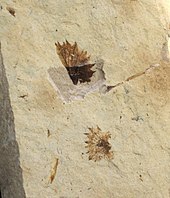 | ||
|
An extinct coryloid relative. |
||||
|
An extinct coryloid relative |
||||
|
Various Palaeocarpinus fruits |
 | |||
|
A hazel nut |
||||
|
Undescribed |
Undescribed[34] |
|
A betulaceous taxon |
||
|
Undescribed[86] |
|
A cannabaceous fruit |
 | ||
| Fagaceae |
undescribed[34] |
|
An fagaceous morphogenus |
||
|
Undescribed[38] |
|
An extinct fagaceous leaf morphotype. |
|||
| †Fagopsis |
|
Moved from Planera longifolia by Hollick (1909) |
|||
|
An extinct beech relative |
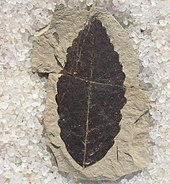 | |||
|
undescribed[42] |
|
An extinct beech relative |
|||
| Fagus |
|
A beech |
 | ||
|
Undescribed[42] |
|
A beech |
|||
| Quercus |
|
An oak leaf species |
|||
|
Various oak leaves and pollen |
||||
|
undescribed[34] |
|
An fagaceous morphogenus |
|||
| Juglandaceae | Carya |
|
A punitive hickory |
||
|
A punitive hickory |
||||
|
Undescribed[27] |
|
A possible hickory |
|||
|
A walnut family relative. |
||||
|
A walnut family relative. |
||||
|
A wingnut relative. |
||||
|
Undescribed |
Undescribed[21] |
|
Juglandaceous leaves |
||
| Moraceae |
Undescribed[36] |
|
Fragmentary fig? leaves |
||
|
Undescribed[4] |
|
A mulberry, two types known. |
|||
|
Undescribed |
|
Fragmentary mulberry? leaves |
|||
| Myricaceae | Comptonia |
|
A comptonia species |
 | |
|
A comptonia species | ||||
|
A comptonia species |
||||
|
A comptonia species |
||||
| Myrica |
|
A bayberry species |
|||
|
Undescribed[36] |
|
A possible bayberry |
|||
| Polygalaceae | †Deviacer |
|
A milkwort relative. |
||
|
A milkwort relative |
 | |||
| Rhamnaceae |
Undescribed[36] |
|
A ceanothus leaf |
||
|
Undescribed[36] |
|
A Paliurus leaf |
|||
|
A buckthorn species. |
||||
| Rosaceae |
Undescribed[4] |
|
A service berry |
||
| Crataegus |
|
A hawthorn leaf |
|||
|
A hawthorn fruit |
||||
|
A hawthorn relative |
||||
|
Undescribed[20] |
|
An Hesperomeles relative. |
|||
|
Undescribed[21] |
|
Possible oceanspray leaves |
|||
|
Undescribed[20] |
|
A Japanese kerria species |
|||
|
An apple |
||||
|
A maloid species possibly apple or pear |
||||
| Neviusia |
|
||||
|
A snow-wreath |
||||
|
An Osoberry |
||||
|
A rose family flower |
||||
|
Undescribed[92] |
|
An amygdaloid leaf morphotaxon |
|||
| Photinia |
|
A Christmas-berry relative |
 | ||
|
Undescribed[34] |
|
A Christmas-berry relative |
|||
|
Undescribed[42] |
|
A possible nine-bark |
|||
| Prunus |
|
A prunoid wood. |
|||
|
A cherry flower |
 | |||
|
"Princeton chert species 1"[105] |
|
A prunoid seed. |
|||
|
"Princeton chert species 2"[105] |
|
A prunoid seed. |
|||
|
"Princeton chert species 3"[105] |
|
A prunoid seed. |
|||
|
"Republic species 1"[52] |
|
A prunoid leaf. |
|||
|
"Republic species 2"[52] |
|
A prunoid leaf. |
|||
|
"Republic species 3"[52] |
|
A prunoid leaf. |
|||
|
A prunoid leaf. |
||||
|
Amygdaloid leaves and flowers of prunoid affinity. |
||||
|
Undescribed[5] |
|
A firethorn sp.[5] |
|||
|
Undescribed[36] |
|
A pear |
|||
|
Undescribed[5] |
|
A maloid species possibly apple or pear |
|||
|
A blackberry |
||||
|
A punitive sorbus |
||||
|
A rowan relative |
||||
|
A bridal wreath |
||||
|
A sorbarieous genus |
 |
Malvids
[edit]| Family | Genus | species | Sites | Notes | Images |
|---|---|---|---|---|---|
| Anacardiaceae | Rhus |
|
A sumac |
 | |
|
A sumac with leaflets on short petiolules |
 | |||
|
A sumac with leaflets on short petiolules |
 | |||
|
A sumac with sessile leaflets |
||||
|
A sumac species |
||||
|
Undescribed[20] |
|
A Peruvian pepper tree species. |
|||
|
An extinct Bursera relative |
 | |||
| Lythraceae | Decodon |
|
|||
|
Undescribed[42] |
|
A swamp loosestrife |
|||
| Malvaceae | Craigia |
|
A Craigia species |
||
|
Undescribed[85] |
|
A Craigia species |
 | ||
| †Florissantia |
|
A Florissantia species |
 | ||
|
Undescribed[27] |
|
A Florissantia species |
|||
|
Undescribed[4] |
|
A hibiscus |
|||
|
Undescribed[85] |
|
A linden relative |
|||
| Tilia |
|
A Linden |
 | ||
|
A Linden relative |
 | |||
|
A Myrtaceous fruit |
||||
|
A leaf of simaroubaceous affinity.[56] |
||||
| Sapindaceae | Acer |
|
single fruit missing a seed. |
||
|
A maple samara. |
||||
|
A maple samara morphospecies. |
||||
|
A maple samara morphospecies. |
||||
|
A maple samara morphospecies. |
||||
|
A maple samara morphospecies. |
||||
|
A maple leaf and samara species. |
||||
|
A maple samara morphospecies. |
||||
|
A maple samara morphospecies. |
||||
|
A maple samara morphospecies. |
||||
|
A maple leaf and samara species. |
||||
|
A maple samara morphospecies. |
||||
|
Various maple leaves and seeds. |
||||
|
A horse chestnut |
||||
| †Bohlenia |
|
A soap berry genus |
 | ||
|
A soap berry genus |
||||
|
Undescribed[34] |
|
A soap berry genus |
|||
|
A Dipteronia species |
 | |||
| Koelreuteria |
|
A Koelreuteria species |
 | ||
|
Undescribed[42] |
A Koelreuteria species |
||||
|
A possible dodonaecous soapberry family flower |
||||
|
A sapindaceous species |
 | |||
| Ulmaceae |
|
An elm relative |
|||
|
An elm wood species. |
 | |||
| Ulmus |
|
An elm |
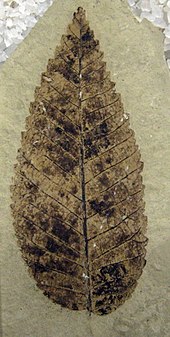 | ||
|
An elm |
 | |||
|
An elm wood species. |
 | |||
|
An elm wood species. |
 | |||
|
Various Elm leaves or fruits |
Saxifragales and basal Superrosids
[edit]| Family | Genus | species | Sites | Notes | Images |
|---|---|---|---|---|---|
| Cercidiphyllaceae |
|
A katsura with suggested affinity to †Joffrea,[42] |
 | ||
|
Unidentified |
|
A katsura relative with suggested affinity to †Joffrea or †Nyssydium[42] |
 | ||
|
Undescribed[20] |
|
A katsura fruit with suggested affinity to †Joffrea or †Nyssydium[20] |
|||
|
Undescribed[20] |
|
A katsura leaf with suggested affinity to †Joffrea or †Nyssydium[20] |
|||
| Grossulariaceae | Ribes |
Undescribed[118] |
|
A current fruit |
|
|
A current |
||||
| Hamamelidaceae | Corylopsis |
|
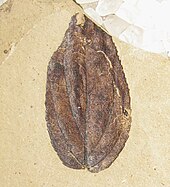 | ||
|
Undescribed[34] |
|
A winter-hazel |
|||
|
 | ||||
| Iteaceae |
|
A Virginia willow species |
|||
|
undescribed[21] |
|
A Virginia willow-like leaf |
|||
| Vitaceae |
|
A grape family fruit of uncertain generic placement[121] |
|||
| incertae sedis |
"Type 1"[120] |
|
A grape family fruit of uncertain generic placement |
||
|
"Type 2"[120] |
|
A grape family fruit of uncertain generic placement |
|||
|
Unidentified |
Unidentified[34] |
|
Vitoideae leaves/seeds |
| Family | Genus | species | Sites | Notes | Images |
|---|---|---|---|---|---|
|
A leaf morphotype of uncertain affiliation |
||||
|
A winged fruit of unidentified affinities |
 | |||
|
A sapindalean flower of uncertain affiliations |
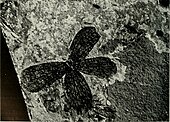 | |||
|
A semi-aquatic dicot of uncertain affinity. |
||||
|
A fruit of uncertain affiliation |
||||
|
A palynomorph uncertain affiliation |
||||
|
A flower of uncertain affiliation |
||||
|
A winged fruit of uncertain affinity |
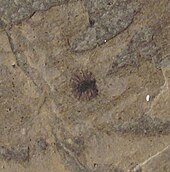 | |||
|
A samara of uncertain affinities. |
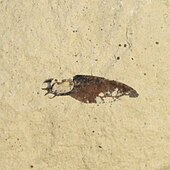 | |||
|
An incertae sedis angiosperm |
 | |||
|
†"Acer" negundifolium (Dawson) LaMotte (1952)[36][56] |
|
Leaf fragments of a "problematic nature" |
Fungi
[edit]A number of fungi have been preserved within the Princeton Chert, though only three have been formally described as of 2024. The first instance of ectomycorrhizae in the fossil record was reported by LePage et al. (1997) who documented mycorrhizal rootlets associated with Pinus roots.[129]
| Order | Genus | species | Sites | Notes | Images |
|---|---|---|---|---|---|
|
An ascomycetan fungus on the host palm Uhlia allenbyensis |
||||
|
undescribed[131] |
|
A jahnulalean fungi. |
|||
| Microascales |
undescribed[131] |
|
A microascalean fungi. |
||
|
undescribed[131] |
|
A microascalean fungi. |
|||
| Pleosporales |
|
An ascomycetan fungus |
|||
|
An ascomycotan fungus |
||||
|
Undescribed |
Undescribed |
Undescribed[129] |
|
Ectomycorrhizae associated with Pinus roots |
Taxa of uncertain modern identification
[edit]A number of taxa identified or described by Penhallow (1902, 1906, 1908) and Berry (1926) have not received much or any modern attention, resulting in uncertainty of taxon affiliation, identification, or synonymy. Many late 1800's to early 1900's identifications of Okanagan highlands fossils were made based on geologic age assumptions ranging between the Miocene to Pliocene, and often specimens were grouped into species bins for taxa first described from Europe.
| Family | Species | Reporting Author | Sites | Notes | Images |
|---|---|---|---|---|---|
| Adoxaceae |
†"Viburnum antiquum" (Newberry) Hollick[28] |
Berry, 1926 |
|
First named as a viburnum leaf morphotype |
|
|
†Viburnum dentoni Lesquereux[36] |
Penhallow, 1908 |
|
A viburnum leaf morphotype |
||
| Araliaceae |
Aralia acerifolia Lesquereux[36] |
Penhallow, 1908 |
|
Fragmentary leaves. |
|
|
Aralia notata Lesquereux[60][36] |
Penhallow, 1902 |
|
Fragmentary leaves. |
||
| Betulaceae |
Alnus alaskana Newberry[36] |
Penhallow, 1908 |
|
Fragmentary leaves |
|
|
Alnus carpinoides Lesquereux[36] |
Penhallow, 1908 |
|
Fragmentary leaves |
||
|
Alnus serrulata fossilis Newberry[36] |
Penhallow, 1908 |
|
Fragmentary leaves |
||
|
Betula angustifolia Newberry[36] |
Penhallow, 1908 |
|
Leaves. |
||
|
Betula heterodonta Newberry[36] |
Penhallow, 1908 |
|
Leaves and one possible cone. |
||
|
Penhallow, 1908 |
|
Fragmetary leaves with cones. |
|||
|
Betula stevensoni Lesquereux[60] |
Penhallow, 1902 |
|
Fragmentary leaves |
||
|
Carpinus grandis Unger ex Heer |
Dawson, 1890 |
|
|||
|
Penhallow, 1908 |
|
||||
| Cercidiphyllaceae |
Dawson, 1879 |
|
A katsura leaf morphotype
|
||
|
Jenkinsella arctica (Heer) Golovneva & Alekseev[28][135] |
Berry, 1926 |
|
A katsura like fruit morphospecies |
||
| Cornaceae |
†Cornophyllum nebrascensis (Schimper) McIver & Basinger[36][136] |
Penhallow, 1908 |
|
A punitive dogwood relative |
|
|
†Cornus suborbifera Lesquereux?[36] |
Penhallow, 1908 |
|
A dogwood |
||
|
†Thuja interrupta Newberry[36] |
Penhallow, 1908 |
|
Type locality Fort Union Formation, North Dakota |
||
|
Penhallow, 1907 |
|
A monocot of uncertain affinity |
|||
|
Andromeda delicatula Lesquereux[36] |
Penhallow, 1908 |
|
Two Ericaceae? leaves |
||
| Fagaceae |
†Castanea castanaefolia (Unger) Knowlton[60] |
Penhallow, 1902 |
|
Fragmentary leaves. |
|
|
†Castanea intermedia? Lesquereux[36] |
Penhallow, 1908 |
|
Single fragmentary specimen |
||
|
†Castanopsis perplexa (Knowlton) Brown[56] |
Penhallow, 1908 |
|
Single fragmentary specimen |
||
|
†Quercus castanopsis Newberry[36] |
Penhallow, 1908 |
|
Type locality Fort Union Formation, Montana |
||
|
†Quercus consimilis Newberry[36] |
Penhallow, 1908 |
|
Type locality Bridge Creek Flora, Orgeon |
||
|
†Quercus dallii Lesquereux[36] |
Dawson, 1891 |
|
Type locality Cook Inlet, Alaska |
||
|
†Quercus groenlandica Heer[28] |
Berry, 1926 |
|
Type locality Greenland |
||
|
†Quercus penhallowi Trelease[36] |
Penhallow, 1908 |
|
Type locality Fort Union Formation, North Dakota |
||
|
†Ginkgo digitata (Brongn.) Heer[36] |
Penhallow, 1908 |
|
A ginkgo leaf mophospecies. |
||
| Juglandaceae |
†Carya antiquorum Newberry[36] |
Penhallow, 1908 |
|
A Carya leaf morphospecies |
|
|
†Juglans nigella Heer[36] |
Dawson, 1876 |
|
Type locality Cook Inlet, Alaska |
||
|
†Juglans occidentalis Newberry[36] |
Penhallow, 1908 |
|
Type locality Green River Formation, Wyoming |
||
|
†Juglans rhamnoides Lesquereux[36] |
Penhallow, 1908 |
|
Type locality Evanston, Utah |
||
|
†Cinnamomum affine Lesquereux[36] |
Dawson, 1890 |
|
A cinnamon leaf morphospecies |
||
|
†Pterospermites alaskana Knowlton[28] |
Berry, 1926 |
|
Type locality Keni Formation |
||
| Moraceae |
Penhallow, 1908 |
|
Type locality Most Basin Bílina Czech Republic |
||
|
Ficus asiminaefolia Lesquereux |
Penhallow, 1908 |
|
Type locality "Rock Corral", California |
||
|
Ficus decandolleana Heer |
Penhallow, 1908 |
|
Type locality Monod, Switzerland |
||
|
Ficus populina Heer |
Penhallow, 1908 |
|
Type locality Monod, Switzerland |
||
|
Ficus ungeri Lesquereux |
Penhallow, 1908 |
|
Type locality Green River Formation, Whyoming |
||
|
Musophyllum complicatum Lesquereux[36][28] |
Penhallow, 1908 |
|
A monocot morphogenus |
||
| Myricaceae |
†Comptonia dryandroides Unger[36] |
Penhallow, 1908 |
|
A Comptonia leaf morphospecies |
|
|
†Comptonia partita (Lesquereux) Berry[36] |
Penhallow, 1908 |
|
A Comptonia leaf morphospecies |
||
|
†Myrica (?) personata Knowlton[36] |
Penhallow, 1908 |
|
Type locality Fossil, Oregon |
||
|
†Onoclea hebridica (Forbes) Bell[36] |
Penhallow, 1908 |
|
Type locality Isle of Mull, UK |
||
|
†Osmunda heeri Gaudin[36] |
Penhallow, 1908 |
|
Type locality Rivaz, Switzerland |
||
|
†Pinus lardyana Heer[36] |
Penhallow, 1908 |
|
Type locality Switzerland |
||
| Poaceae |
†Phragmites alaskana Heer[28] |
Berry, 1926 |
|
A grass/sedge leaf morphogenus |
|
|
Berry, 1926 |
|
A grass/sedge leaf morphogenus |
|||
|
Potamogeton (?) verticillatus Lesquereux[36] |
Penhallow, 1908 |
|
Type locality Florissant, Colorado |
||
| Rhamnaceae |
†Rhamnus belmontensis Knowlton & Cockerell[36] |
Penhallow, 1908 |
|
Type locality Laramie, Colorado |
|
|
†Rhamnus eridani Unger[36] |
Penhallow, 1908 |
|
Type locality Disco Island, Greenland, |
||
|
†Rhamnus gaudini Heer[36] |
Penhallow, 1908 |
|
Type locality Switzerland, |
||
|
†Prunus (?) merriami Knowlton[36][56] |
Penhallow, 1908 |
|
Type locality Mascall Formation, Oregon |
||
|
†Zanthoxylum spireaefolium Lesquereux[36] |
Penhallow, 1908 |
|
Type locality Florissant, Colorado |
||
| Salicaceae |
†Populus cordata Newberry[36] |
Penhallow, 1908 |
|
Type locality Fort Union Formation, Montana |
|
|
†Populus latior Braun[36] |
Dawson, 1879 |
|
Type locality Europe |
||
|
Penhallow, 1908 |
|
Type locality Switzerland |
|||
|
†Populus polymorpha Newberry[36] |
Penhallow, 1908 |
|
Type locality Bridge Creek, Oregon |
||
|
†Populus zaddachi Heer[36] |
Penhallow, 1908 |
|
Type locality Samland, Russia |
||
|
†Salix varians Goeppert[36] |
Penhallow, 1908 |
|
Type locality Europe |
||
|
†Acer chaneyi Knowlton[36] |
Penhallow, 1908 |
|
Type locality Mascall Formation, Oregon |
||
|
†Taxites olriki Heer[36] |
Penhallow, 1908 |
|
Type locality Atanekerdluk, Greenland |
||
|
†Typha lesquereuxi Cockerell |
Penhallow, 1908 |
|
Type locality Florissant, Colorado |
||
| Ulmaceae |
†Planera lingualis Knowlton & Cockerell[36][56] |
Penhallow, 1908 |
|
Type locality Fort Union Formation, Wyoming |
|
|
†Ulmus minuta Goeppert[36] |
Penhallow, 1908 |
|
Type locality Germany |
||
|
†Ulmus speciosa Newberry[36] |
Penhallow, 1908 |
|
Type locality Bridge Creek, Oregon |
||
|
†Ulmus tenuinervis Lesquereux[36] |
Penhallow, 1908 |
|
Type locality Middle Park, Colorado |
||
| Vitaceae |
†Vitis alaskana Cockerell?[36] |
Penhallow, 1908 |
|
Type locality Admiralty Inlet, Alaska |
|
|
†Vitis olriki Heer?[36] |
Penhallow, 1908 |
|
Type locality Atanekerdluk, Greenland |
||
| Incertae sedis |
†"Acer" grahamensis Knowlton & Cockerell[28] |
Berry, 1926 |
|
Type locality Port Graham, Alaska |
|
|
†Leguminosites arachioides Lesquereux[36] |
Penhallow, 1908 |
|
Type locality is Evanston, Wyoming |
References
[edit]- ^ a b West, C.; Greenwood, D.; Reichgelt, T.; Lowe, A.; Vachon, J.; Basinger, J. (2020). "Paleobotanical proxies for early Eocene climates and ecosystems in northern North America from middle to high latitudes". Climate of the Past. 16 (4): 1387–1410. Bibcode:2020CliPa..16.1387W. doi:10.5194/cp-16-1387-2020. S2CID 236890548.
- ^ a b c DeVore, M.; Pigg, K. (2016). "Biotic processes in the Okanagan Highlands floras: Possible evidence of hybridization in plants adapting to a temperate forest". Canadian Journal of Earth Sciences. 53 (6): 622–629. Bibcode:2016CaJES..53..622D. doi:10.1139/cjes-2015-0190. hdl:1807/71962.
- ^ DeVore, M.L.; Pigg, K.B.; Wehr, W.C. (2005). "Systematics and phytogeography of selected Eocene Okanagan Highlands plants". Canadian Journal of Earth Sciences. 42 (2): 205–214. Bibcode:2005CaJES..42..205D. doi:10.1139/e04-072.
- ^ a b c d e f g h i j k l m n o p q Wehr, W. C.; Hopkins, D. Q. (1994). "The Eocene orchards and gardens of Republic, Washington". Washington Geology. 22 (3): 27–34.
- ^ a b c d e f DeVore, M. L.; Pigg, K. B. (2007). "A brief review of the fossil history of the family Rosaceae with a focus on the Eocene Okanogan Highlands of eastern Washington State, USA, and British Columbia, Canada". Plant Systematics and Evolution. 266 (1–2): 45–57. Bibcode:2007PSyEv.266...45D. doi:10.1007/s00606-007-0540-3. S2CID 10169419.
- ^ a b c Moss, P. T.; Greenwood, D. R.; Archibald, S. B. (2005). "Regional and local vegetation community dynamics of the Eocene Okanagan Highlands (British Columbia – Washington State) from palynology". Canadian Journal of Earth Sciences. 42 (2): 187–204. Bibcode:2005CaJES..42..187M. doi:10.1139/E04-095.
- ^ a b Archibald, S. B.; Cannings, R. A. (2022). "The first Odonata from the early Eocene Allenby Formation of the Okanagan Highlands, British Columbia, Canada (Anisoptera, Aeshnidae and cf. Cephalozygoptera, Dysagrionidae)". The Canadian Entomologist. 154 (1): e29. doi:10.4039/tce.2022.16. S2CID 250035713.
- ^ Höy, T.; Friedman, R.; Gabites, J. Paleogene Penticton Group, Boundary area, Southern British Columbia (Parts of NTS 082E): Geochronology and Implications for Precious Metal Mineralization (PDF) (Report). Geoscience BC Summary of Activities 2020: Minerals, Geoscience BC, Report 2021-01. Geoscience BC. pp. 55–66.
- ^ Pigg, K. B.; DeVore, M. L. (2016). "A review of the plants of the Princeton chert (Eocene, British Columbia, Canada)". Botany. 94 (9): 661–681. doi:10.1139/cjb-2016-0079. hdl:1807/73571.
- ^ a b c Poinar, G.; Archibald, S.; Brown, A. (1999). "New amber deposit provides evidence of early Paleogene extinctions, paleoclimates, and past distributions". The Canadian Entomologist. 131 (2): 171–177. doi:10.4039/Ent131171-2. S2CID 85718312.
- ^ Archibald, S. B.; Rasnitsyn, A. P.; Brothers, D. J.; Mathewes, R. W. (2018). "Modernisation of the Hymenoptera: ants, bees, wasps, and sawflies of the early Eocene Okanagan Highlands of western North America". The Canadian Entomologist. 150 (2): 205–257. doi:10.4039/tce.2017.59. ISSN 0008-347X. S2CID 90017208.
- ^ a b Siver, P. A.; Wolfe, A. P.; Edlund, M. B.; Sibley, J.; Hausman, J.; Torres, P.; Lott, A. M. (2019). "Aulacoseira giraffensis (Bacillariophyceae), a new diatom species forming massive populations in an Eocene lake". Plant Ecology and Evolution. 152 (2): 358–367. doi:10.5091/plecevo.2019.1586. S2CID 199531867.
- ^ a b Siver, P. A.; Skogstad, A.; Nemcova, Y. (2019). "Endemism, palaeoendemism and migration: the case for the 'European endemic', Mallomonas intermedia". European Journal of Phycology. 54 (2): 222–234. Bibcode:2019EJPhy..54..222S. doi:10.1080/09670262.2018.1544377. S2CID 85555530.
- ^ Wolfe, A.; Edlund, M. (2005). "Taxonomy, phylogeny, and paleoecology of Eoseira wilsonii gen. et sp. nov., a Middle Eocene diatom (Bacillariophyceae: Aulacoseiraceae) from lake sediments at Horsefly, British Columbia, Canada". Canadian Journal of Earth Sciences. 42 (2): 243–257. Bibcode:2005CaJES..42..243W. doi:10.1139/e04-051.
- ^ a b Kuc, M. (1972). "Muscites eocenicus sp. nov.—a fossil moss from the Allenby Formation (middle Eocene), British Columbia". Canadian Journal of Earth Sciences. 9 (5): 600–602. Bibcode:1972CaJES...9..600K. doi:10.1139/e72-049.
- ^ a b c d e f Kuc, M. (1974). "Fossil mosses from the bisaccate zone of the mid-Eocene Allenby Formation, British Columbia". Canadian Journal of Earth Sciences. 11 (3): 409–421. Bibcode:1974CaJES..11..409K. doi:10.1139/e74-037.
- ^ a b c d Miller, N. G. (1980). "Fossil mosses of North America and their significance". The Mosses of North America. pp. 9–36.
- ^ a b Janssens, J.; Horton, D.G.; Basinger, J. (1979). "Aulacomnium heterostichoides sp. nov., an Eocene moss from south central British Columbia". Canadian Journal of Botany. 57 (20): 2150–2161. doi:10.1139/b79-268.
- ^ a b c d e f g h i j Dillhoff, R.M.; Dillhoff, T.A.; Greenwood, D.R.; DeVore, M.L.; Pigg, K.B. (2013). "The Eocene Thomas Ranch flora, Allenby Formation, Princeton, British Columbia, Canada". Botany. 91 (8): 514–529. doi:10.1139/cjb-2012-0313.
- ^ a b c d e f g h i j k l m n o p q r s t u v w x y z aa ab ac ad ae af ag ah ai aj ak al am an ao ap aq ar as at au av aw ax ay az ba bb bc bd be Pigg, K.B.; Manchester, S.R.; DeVore, M.L. (2023). "The early Eocene flora of Horsefly, British Columbia, Canada and its phytogeographic significance". Fossil Imprint. 79 (2): 126–143. doi:10.37520/fi.2023.007.
- ^ a b c d e f g h i j k l m n o p q r s t u v w x y z aa ab ac ad ae af ag ah ai aj ak al am an ao ap aq ar as at au av aw ax ay az ba bb Smith, R.Y.; Basinger, J.F.; Greenwood, D.R. (2012). "Early Eocene plant diversity and dynamics in the Falkland flora, Okanagan Highlands, British Columbia, Canada". Palaeobiodiversity and Palaeoenvironments. 92 (3): 309–328. Bibcode:2012PdPe...92..309S. doi:10.1007/s12549-011-0061-5. S2CID 129448108.
- ^ a b Wing, S.; DiMichele, W. (1996). "The Republic Highlands". Washington Geology. 24 (2): 40.
- ^ a b c d e f g h i j Wehr, W. "Middle Eocene insects and plants of the Okanogan Highlands". In Martin, J. (ed.). Contributions to the Paleontology and Geology of the West Coast. Seattle, Washington: University of Washington Press. pp. 99–109.
- ^ Karafit, S. J.; Rothwell, G. W.; Stockey, R. A.; Nishida, H. (2006). "Evidence for sympodial vascular architecture in a filicalean fern rhizome: Dickwhitea allenbyensis gen. et sp. nov.(Athyriaceae)". International Journal of Plant Sciences. 167 (3): 721–727. doi:10.1086/501036. S2CID 85348245.
- ^ Stockey, R. A.; Nishida, H.; Rothwell, G. W. (1999). "Permineralized ferns from the middle Eocene Princeton chert. I. Makotopteris princetonensis gen. et sp. nov.(Athyriaceae)". International Journal of Plant Sciences. 160 (5): 1047–1055. doi:10.1086/314191. PMID 10506480. S2CID 33465214.
- ^ Smith, S. Y.; Stockey, R. A.; Nishida, H.; Rothwell, G. W. (2006). "Trawetsia princetonensis gen. et sp. nov.(Blechnaceae): a permineralized fern from the Middle Eocene Princeton Chert". International Journal of Plant Sciences. 167 (3): 711–719. doi:10.1086/501034. S2CID 85160532.
- ^ a b c d e f g h i j k l m n o p q r s t u v w x y z aa ab ac ad ae af ag ah ai aj ak al am an ao Greenwood, D.R.; Pigg, K.B.; Basinger, J.F.; DeVore, M.L. (2016). "A review of paleobotanical studies of the Early Eocene Okanagan (Okanogan) Highlands floras of British Columbia, Canada, and Washington, U.S.A." Canadian Journal of Earth Sciences. 53 (6): 548–564. Bibcode:2016CaJES..53..548G. doi:10.1139/cjes-2015-0177.
- ^ a b c d e f g h i j k l m n o p q r s t u v w x y z aa ab ac ad ae af ag ah Berry, E. (1926). Tertiary floras from British Columbia (PDF) (Report). Geological series; Contributions to Canadian Paleontology. Ottawa, Canada: Geological Survey of Canada. pp. 91–116.
- ^ a b Pigg, K. B.; DeVore, M. L.; Greenwood, D. R.; Sundue, M. A.; Schwartsburd, P.; Basinger, J. F. (2021). "Fossil Dennstaedtiaceae and Hymenophyllaceae from the Early Eocene of the Pacific Northwest". International Journal of Plant Sciences. 182 (9): 793–807. doi:10.1086/715633. S2CID 239036762.
- ^ Cevallos-Ferriz, S. R.; Stockey, R. A.; Pigg, K. B. (1991). "The Princeton chert: evidence for in situ aquatic plants". Review of Palaeobotany and Palynology. 70 (1–2): 173–185. Bibcode:1991RPaPa..70..173C. doi:10.1016/0034-6667(91)90085-H.
- ^ Dawson, J. W. (1879). "Appendix B. List of tertiary plants in the southern part of British Columbia, with the description of a new species of Equisetum". Geological Survey of Canada, Report of Progress for. Vol. 1877–1878. Montreal, Quebec: Dawson Brothers. p. 187.
- ^ a b c d e Dawson, J. W. (1890). On fossil plants from the Similkameen Valley and other places in the southern interior of British Columbia. CIHM/ICMH Microfiche no. 14891. Royal Society of Canada. ISBN 978-0-665-14891-0.
- ^ Joseph, N. L. (1988). "Important Eocene Flora and Fauna Unearthed at Republic, Washington". Rocks & Minerals. 63 (2): 146–151. Bibcode:1988RoMin..63..146J. doi:10.1080/00357529.1988.11761830.
- ^ a b c d e f g h i j k l m n o p q r s t u v w x y z aa ab ac ad ae af ag ah ai aj ak al am an ao ap aq ar as at au av aw ax ay az ba bb bc bd be bf bg bh bi bj bk bl bm bn bo Greenwood, D.; Archibald, S.; Mathewes, R.; Moss, P. (2005). "Fossil biotas from the Okanagan Highlands, southern British Columbia and northeastern Washington State: climates and ecosystems across an Eocene landscape". Canadian Journal of Earth Sciences. 42 (2): 167–185. Bibcode:2005CaJES..42..167G. doi:10.1139/e04-100.
- ^ Collinson, M. E. (2001). "Cainozoic ferns and their distribution". Brittonia. 53 (2): 173–235. Bibcode:2001Britt..53..173C. doi:10.1007/BF02812700. S2CID 19984401.
- ^ a b c d e f g h i j k l m n o p q r s t u v w x y z aa ab ac ad ae af ag ah ai aj ak al am an ao ap aq ar as at au av aw ax ay az ba bb bc bd be bf bg bh bi bj bk bl bm bn bo bp bq br bs bt bu bv bw bx by bz ca cb cc cd ce cf cg ch ci cj ck cl cm cn co cp cq Penhallow, D. P. (1908). Report on Tertiary plants of British Columbia collected by Lawrence M. Lambe in 1906 together with a discussion of previously recorded tertiary floras (Report). Geological series; Contributions to Canadian Paleontology. Ottawa, Canada: Geological Survey of Canada. pp. 1–167.
- ^ Arnold, C. A. (1955). "A Tertiary Azolla from British Columbia" (PDF). Contributions from the Museum of Paleontology, University of Michigan. 12 (4): 37–45.
- ^ a b c d e f g h i j k l m Guthrie, G. H. (1995). A high resolution palaeoecological analysis of an Eocene fossil locality from Quilchena, British Columbia (MA thesis). Simon Fraser University.
- ^ a b c d e f g h i j k l m n o p Mathewes, R. W.; Greenwood, D. R.; Archibald, S. B. (2016). "Paleoenvironment of the Quilchena flora, British Columbia, during the Early Eocene Climatic Optimum" (PDF). Canadian Journal of Earth Sciences. 53 (6): 574–590. Bibcode:2016CaJES..53..574M. doi:10.1139/cjes-2015-0163. hdl:1807/71979.
- ^ Greenwood, D. (2022). "A fossil beech fern (cf. Phegopteris (C. Presl) Fée) from Driftwood Canyon Provincial Park, British Columbia". The Canadian Field-Naturalist. 136 (3): 201–205. doi:10.22621/cfn.v136i3.3001. S2CID 257139984.
- ^ Hopkins, D.; Johnson, K. (1997). "First Record of cycad leaves from the Eocene Republic flora" (PDF). Washington Geology. 25 (4): 37. Retrieved 29 September 2021.
- ^ a b c d e f g h i j k l m n o p q r s t u v w x y z aa ab ac ad ae af ag ah ai aj ak al am an ao ap aq ar as at au av aw ax ay az ba bb bc bd be bf bg bh bi bj bk bl bm bn bo bp bq br Dillhoff, R.M.; Leopold, E.B.; Manchester, S.R. (2005). "The McAbee flora of British Columbia and its relations to the Early-Middle Eocene Okanagan Highlands flora of the Pacific Northwest" (PDF). Canadian Journal of Earth Sciences. 42 (2): 151–166. Bibcode:2005CaJES..42..151D. doi:10.1139/e04-084.
- ^ a b Mustoe, G.E. (2002). "Eocene Ginkgo leaf fossils from the Pacific Northwest". Canadian Journal of Botany. 80 (10): 1078–1087. doi:10.1139/b02-097.
- ^ a b c d e f g h i j Schorn, H. E.; Wehr, W. C. (1996). "The conifer flora from the Eocene uplands at Republic, Washington". Washington Geology. 24 (2): 22–24.
- ^ a b Kotyk, M.E.A.; Basinger, J.F.; McIlver, E.E. (2003). "Early Tertiary Chamaecyparis Spach from Axel Heiberg Island, Canadian High Arctic". Canadian Journal of Botany. 81 (2): 113–130. doi:10.1139/B03-007.
- ^ Terry, R.; Pyne, M.; Bartel, J.; Adams, R. (2016). "A molecular biogeography of the New World cypresses (Callitropsis, Hesperocyparis; Cupressaceae)". Plant Systematics and Evolution. 302 (7): 921–942. Bibcode:2016PSyEv.302..921T. doi:10.1007/s00606-016-1308-4. JSTOR 44853291. S2CID 4236846.
- ^ a b c d e f g h i j Arnold, C. A. (1955). "Tertiary conifers from the Princeton coal field of British Columbia" (PDF). University of Michigan: Contributions from the Museum of Paleontology. 12: 245–258.
- ^ "Conifers and Ginkgos". Burke Museum Paleobotany Project. Retrieved 28 May 2023.
- ^ Basinger, J. F. (1981). "The vegetative body of Metasequoia milleri from the Middle Eocene of southern British Columbia". Canadian Journal of Botany. 59 (12): 2379–2410. doi:10.1139/b81-291.
- ^ a b c d e f g h i Penhallow, D. P. (1907). "A report on fossil plants from the International Boundary Survey for 1903–1905, collected by Dr. R A Daly.". Proceedings and Transactions of the Royal Society of Canada. 3. Vol. 1 (sect 4). Royal Society of Canada. pp. 287–351.
- ^ a b Chaney, R.W. (1951). "A revision of fossil Sequoia and Taxodium in western North America based on the recent discovery of Metasequoia". Transactions of the American Philosophical Society. 40 (3): 231.
- ^ a b c d e f g h i j k l m n o p q r s t u v w x y Wolfe, J.A.; Wehr, W.C. (1987). Middle Eocene dicotyledonous plants from Republic, northeastern Washington (Report). Bulletin. Vol. 1597. United States Geological Survey. pp. 1–25. doi:10.3133/b1597.
- ^ LePage, B. A. (2007). "The taxonomy and biogeographic history of Glyptostrobus Endlicher (Cupressaceae)". Bulletin of the Peabody Museum of Natural History. 48 (2): 359–426. doi:10.3374/0079-032x(2007)48[359:ttabho]2.0.co;2. S2CID 128968431.
- ^ a b c d e f g Berry, E.W. (1929). A revision of the flora of the Latah Formation (Report). Professional Paper. United States Geological Survey. pp. 225–265. doi:10.3133/pp154h. 154-H.
- ^ Schorn, Howard; Wehr, Wesley (1986). "Abies milleri, sp. nov., from the Middle Eocene Klondike Mountain Formation, Republic, Ferry County, Washington". Burke Museum Contributions in Anthropology and Natural History (1): 1–7.
- ^ a b c d e f g h i j k l m n o LaMotte, R.S. (1952). Catalogue of the Cenozoic plants of North America through 1950. Geological Society of America Memoirs. Vol. 51. Geological Society of America. doi:10.1130/MEM51.
- ^ a b Chaney, R.; Axelrod, D. (1959). Miocene Floras of the Columbia Plateau: Part II. Systematic Considerations, by Ralph W. Chaney and Daniel I. Axelrod. Carnegie Institution of Washington. pp. 1–226.Miocene Floras of the Columbia Plateau at the HathiTrust Digital Library
- ^ a b LePage, B. A.; Basinger, J. F. (1995). "Evolutionary history of the genus Pseudolarix Gordon (Pinaceae)". International Journal of Plant Sciences. 156 (6): 910–950. doi:10.1086/297313. S2CID 84724593.
- ^ a b Gooch, N. L. (1992). "Two new species of Pseudolarix Gordon (Pinaceae) from the middle Eocene of the Pacific Northwest". PaleoBios. 14: 13–19.
- ^ a b c d e f g h i Penhallow, D. P. (1902). "Notes on Cretaceous and Tertiary plants of Canada.". Transactions of the Royal Society of Canada. 1902-03. Vol. 8 (sect 4). Ottawa, Canada: Royal Society of Canada. pp. 31–91.
- ^ a b c Stockey, R. A. (1984). "Middle Eocene Pinus remains from British Columbia". Botanical Gazette. 145 (2): 262–274. doi:10.1086/337455. S2CID 85063424.
- ^ Miller Jr, C. N. (1973). "Silicified cones and vegetative remains of Pinus from Eocene of British Columbia". Contributions from the Museum of Paleontology, University of Michigan. 24: 101–118.
- ^ a b Klymiuk, A. A.; Stockey, R. A.; Rothwell, G. W. (2011). "The first organismal concept for an extinct species of Pinaceae: Pinus arnoldii Miller". International Journal of Plant Sciences. 172 (2): 294–313. doi:10.1086/657649. S2CID 84137991.
- ^ Stockey, R.S. (1983). "Pinus driftwoodensis sp.n. from the early Tertiary of British Columbia". Botanical Gazette. 144 (1): 148–156. doi:10.1086/337355. JSTOR 2474678. S2CID 84907438.
- ^ LaMotte, R.S. (1944). "Supplement to catalogue of Mesozoic and Cenozoic plants of North America, 1919–37". United States Geological Survey Bulletin. 924: 307.
- ^ a b c DeVore, ML; Taylor, W; Pigg, KB (2015). "Nuphar carlquistii sp. nov. (Nymphaeaceae): A Water Lily from the Latest Early Eocene, Republic, Washington". International Journal of Plant Sciences. 176 (4): 365–377. doi:10.1086/680482. S2CID 84149074.
- ^ a b Cevallos-Ferriz, S. R.; Stockey, R. A. (1989). "Permineralized fruits and seeds from the Princeton chert (Middle Eocene) of British Columbia: Nymphaeaceae". Botanical Gazette. 150 (2): 207–217. doi:10.1086/337765. S2CID 86651676.
- ^ a b c d Wehr, W.C. (1995). "Paleobotanical Significance of Eocene Flowers, Fruits, and Seeds from Republic, Washington". Washington Geology. 24 (2): 25–2.
- ^ Little, Stefan A.; Stockey, Ruth A.; Penner, Bonnie (March 2009). "Anatomy and development of fruits of Lauraceae from the Middle Eocene Princeton Chert". American Journal of Botany. 96 (3): 637–651. doi:10.3732/ajb.0800318. PMID 21628220. S2CID 38272445.
- ^ Cevallos-Ferriz, S. R.; Stockey, R. A. (1990). "Vegetative remains of the Magnoliaceae from the Princeton chert (middle Eocene) of British Columbia". Canadian Journal of Botany. 68 (6): 1327–1339. doi:10.1139/b90-169.
- ^ Smith, S. Y.; Stockey, R. A. (2007). "Establishing a fossil record for the perianthless Piperales: Saururus tuckerae sp. nov.(Saururaceae) from the Middle Eocene Princeton Chert". American Journal of Botany. 94 (10): 1642–1657. doi:10.3732/ajb.94.10.1642. PMID 21636361.
- ^ Manchester, S.; Pigg, K. (2008). "The Eocene mystery flower of McAbee, British Columbia". Botany. 86 (9): 1034–1038. doi:10.1139/B08-044.
- ^ Stockey, R. A. (1987). "A permineralized flower from the Middle Eocene of British Columbia". American Journal of Botany. 74 (12): 1878–1887. doi:10.1002/j.1537-2197.1987.tb08790.x.
- ^ Stockey, R. A.; Pigg, K. B. (1991). "Flowers and fruits of Princetonia allenbyensis (Magnoliopsida; family indet.) from the Middle Eocene Princeton chert of British Columbia". Review of Palaeobotany and Palynology. 70 (1–2): 163–172. Bibcode:1991RPaPa..70..163S. doi:10.1016/0034-6667(91)90084-G.
- ^ Erwin, D. M.; Stockey, R. A. (1991). "Silicified monocotyledons from the Middle Eocene Princeton chert (Allenby Formation) of British Columbia, Canada". Review of Palaeobotany and Palynology. 70 ((1-2)): 147–162. Bibcode:1991RPaPa..70..147E. doi:10.1016/0034-6667(91)90083-F.
- ^ Pigg, K. B.; Bryan, F. A.; DeVore, M. L. (2018). "Paleoallium billgenseli gen. et sp. nov.: fossil monocot remains from the latest Early Eocene Republic Flora, northeastern Washington State, USA". International Journal of Plant Sciences. 179 (6): 477–486. doi:10.1086/697898. S2CID 91055581.
- ^ Grímsson, F.; Zetter, R.; Halbritter, H.; Grimm, G. W. (2014). "Aponogeton pollen from the Cretaceous and Paleogene of North America and West Greenland: Implications for the origin and palaeobiogeography of the genus". Review of Palaeobotany and Palynology. 200 (100): 161–187. Bibcode:2014RPaPa.200..161G. doi:10.1016/j.revpalbo.2013.09.005. PMC 4047627. PMID 24926107.
- ^ Cevallos-Ferriz, S. R.; Stockey, R. A. (1988). "Permineralized fruits and seeds from the Princeton chert (Middle Eocene) of British Columbia: Araceae". American Journal of Botany. 75 (8): 1099–1113. doi:10.1002/j.1537-2197.1988.tb08822.x.
- ^ Bogner, J.; Johnson, K. R.; Kvacek, Z.; Upchurch, G. R. (2007). "New fossil leaves of Araceae from the Late Cretaceous and Paleogene of western North America" (PDF). Zitteliana. A (47): 133–147. ISSN 1612-412X.
- ^ Erwin, D.M.; Stockey, R.A. (1994). "Permineralized monocotyledons from the middle Eocene Princeton chert (Allenby Formation) of British Columbia: Arecaceae". Palaeontographica Abteilung B. 234: 19–40.
- ^ Hesse, M.; Zetter, R. (2005). "Ultrastructure and diversity of recent and fossil zona-aperturate pollen grains". Plant Systematics and Evolution. 255 (3): 145–176. Bibcode:2005PSyEv.255..145H. doi:10.1007/s00606-005-0358-9. S2CID 1964359.
- ^ Erwin, D. M.; Stockey, R. A. (1992). "Vegetative body of a permineralized monocotyledon from the Middle Eocene Princeton chert of British Columbia". Courier Forschungsinstitut Senckenberg. 147: 309–327.
- ^ Erwin, D. M.; Stockey, R. A. (1991). "Soleredera rhizomorpha gen. et sp. nov., a permineralized monocotyledon from the Middle Eocene Princeton chert of British Columbia, Canada". Botanical Gazette. 152 (2): 231–247. doi:10.1086/337885. S2CID 85180086.
- ^ a b Huegele, I. B.; Manchester, S. R. (2022). "Newly Recognized Reproductive Structures Linked with Langeria from the Eocene of Washington, USA, and their Affinities with Platanaceae". International Journal of Plant Sciences. In press.
- ^ a b c d e f g h i Wehr, W.C. (1995). "Early Tertiary flowers, fruits and seeds of Washington State and adjacent areas". Washington Geology. 23 (3): 3–16.
- ^ a b c d e Pigg, K.; Wehr, W.C. (2002). "Early Tertiary flowers, fruits and seeds of Washington State and adjacent areas Part-III". Washington Geology. 30 (3–4): 3–16.
- ^ a b c Manchester, S.; Pigg, K. B.; Kvaček, Z; DeVore, M. L.; Dillhoff, R. M. (2018). "Newly recognized diversity in Trochodendraceae from the Eocene of western North America". International Journal of Plant Sciences. 179 (8): 663–676. doi:10.1086/699282. S2CID 92201595.
- ^ a b c d Manchester, S. R.; Kvaček, Z.; Judd, W. S. (2020). "Morphology, anatomy, phylogenetics and distribution of fossil and extant Trochodendraceae in the Northern Hemisphere". Botanical Journal of the Linnean Society. 195 (3): 467–484. doi:10.1093/botlinnean/boaa046.
- ^ Pigg, K.B.; Dillhoff, R.M.; DeVore, M.L.; Wehr, W.C. (2007). "New diversity among the Trochodendraceae from the Early/Middle Eocene Okanogan Highlands of British Columbia, Canada, and Northeastern Washington State, United States". International Journal of Plant Sciences. 168 (4): 521–532. doi:10.1086/512104. S2CID 86524324.
- ^ Pigg, K.B.; Wehr, W.C.; Ickert-Bond, S.M. (2001). "Trochodendron and Nordenskioldia (Trochodendraceae) from the Middle Eocene of Washington State, U.S.A.". International Journal of Plant Sciences. 162 (5): 1187–1198. doi:10.1086/321927. S2CID 45399415.
- ^ a b Call, V.B.; Dilcher, D.L. (1997). "The fossil record of Eucommia (Eucommiaceae) in North America". American Journal of Botany. 84 (6): 798–814. doi:10.2307/2445816. JSTOR 2445816. PMID 21708632. S2CID 20464075.
- ^ a b c d e f g Labandeira, C. C. (2002). "Paleobiology of middle Eocene plant-insect associations from the Pacific Northwest: a preliminary report". Rocky Mountain Geology. 37 (1): 31–59. Bibcode:2002RMGeo..37...31L. doi:10.2113/gsrocky.37.1.31.
- ^ Stockey, R. A.; LePage, B. A.; Pigg, K. B. (1998). "Permineralized fruits of Diplopanax (Cornaceae, Mastixioideae) from the middle Eocene Princeton chert of British Columbia". Review of Palaeobotany and Palynology. 103 (3–4): 223–234. Bibcode:1998RPaPa.103..223S. doi:10.1016/S0034-6667(98)00038-4.
- ^ a b Mathewes, R.; Archibald, S. B.; Lundgren, A. (2021). "Tips and identification of early Eocene Fraxinus L. samaras from the Quilchena locality, Okanagan Highlands, British Columbia, Canada". Review of Palaeobotany and Palynology. 104480: 104480. Bibcode:2021RPaPa.29304480M. doi:10.1016/j.revpalbo.2021.104480.
- ^ Crane, P.; Stockey, R. (1987). "Betula leaves and reproductive structures from the Middle Eocene of British Columbia, Canada". Canadian Journal of Botany. 65 (12): 2490–2500. doi:10.1139/b87-338.
- ^ a b c d e f Pigg, K.B.; Manchester S.R.; Wehr W.C. (2003). "Corylus, Carpinus, and Palaeocarpinus (Betulaceae) from the Middle Eocene Klondike Mountain and Allenby Formations of Northwestern North America". International Journal of Plant Sciences. 164 (5): 807–822. doi:10.1086/376816. S2CID 19802370.
- ^ Manchester, S. R.; Dillhoff, R. M. (2004). "Fagus (Fagaceae) fruits, foliage, and pollen from the Middle Eocene of Pacific Northwestern North America". Canadian Journal of Botany. 82 (10): 1509–1517. doi:10.1139/b04-112.
- ^ Manchester, S. R. (1991). "Cruciptera, a new Juglandaceous winged fruit from the Eocene and Oligocene of western North America". Systematic Botany. 16 (4): 715–725. doi:10.2307/2418873. JSTOR 2418873.
- ^ Lowe, A. J.; Greenwood, D. R.; West, C. K.; Galloway, J. M.; Sudermann, M.; Reichgelt, T. (2018). "Plant community ecology and climate on an upland volcanic landscape during the Early Eocene Climatic Optimum: McAbee Fossil Beds, British Columbia, Canada". Palaeogeography, Palaeoclimatology, Palaeoecology. 511: 433–448. Bibcode:2018PPP...511..433L. doi:10.1016/j.palaeo.2018.09.010. S2CID 134962126.
- ^ Smith, R. Y.; Basinger, J. F.; Greenwood, D. R. (2009). "Depositional setting, fossil flora, and paleoenvironment of the Early Eocene Falkland site, Okanagan Highlands, British Columbia". Canadian Journal of Earth Sciences. 46 (11): 811–822. Bibcode:2009CaJES..46..811S. doi:10.1139/E09-053.
- ^ DeVore, M.L.; Moore, S.M.; Pigg, K.B.; Wehr, W.C. (2004). "Fossil Neviusia leaves (Rosaceae: Kerrieae) from the Lower Middle Eocene of Southern British Columbia". Rhodora. 12 (927): 197–209. JSTOR 23314752.
- ^ a b Benedict, JC; DeVore, ML; Pigg, KB (2011). "Prunus and Oemleria (Rosaceae) Flowers from the Late Early Eocene Republic Flora of Northeastern Washington State, U.S.A.". International Journal of Plant Sciences. 172 (7): 948–958. doi:10.1086/660880. S2CID 39391439.
- ^ Basinger, JF (1976). "Paleorosa similkameenensis, gen. et sp. nov., permineralized flowers (Rosaceae) from the Eocene of British Columbia". Canadian Journal of Botany. 54 (20): 2293–2305. doi:10.1139/b76-246.
- ^ Oh, S.-H.; Potter, D. (2005). "Molecular phylogenetic systematics and biogeography of tribe Neillieae (Rosaceae) using DNA sequences of cpDNA, rDNA, and LEAFY". American Journal of Botany. 92 (1): 179–192. doi:10.3732/ajb.92.1.179. PMID 21652396.
- ^ a b c d Cevallos-Ferriz, S. R.; Stockey, R. A. (1990). "Vegetative remains of the Rosaceae from the Princeton chert (Middle Eocene) of British Columbia". IAWA Journal. 11 (3): 261–280. doi:10.1163/22941932-90001183. S2CID 85023353.
- ^ Wolfe, J.A.; Wehr, W.C. (1988). "Rosaceous Chamaebatiaria-like foliage from the Paleogene of western North America". Aliso. 12 (1): 177–200. doi:10.5642/aliso.19881201.14.
- ^ a b c d Flynn, S.; DeVore, M. L.; Pigg, K. B. (2019). "Morphological Features of Sumac Leaves (Rhus, Anacardiaceae), from the Latest Early Eocene Flora of Republic, Washington". International Journal of Plant Sciences. 180 (6): 464–478. doi:10.1086/703526. S2CID 198244783.
- ^ Cevallos-Ferriz, S. R.; Stockey, R. A. (1988). "Permineralized fruits and seeds from the Princeton chert (Middle Eocene) of British Columbia: Lythraceae". Canadian Journal of Botany. 66 (2): 303–312. doi:10.1139/b88-050.
- ^ Kvaček, Z.; Manchester, S. R.; Akhmetiev, M. A. (2005). "Review of the fossil history of Craigia (Malvaceae sl) in the Northern Hemisphere based on fruits and co-occurring foliage". Transactions of the International Palaeobotanical Conference. 1: 114–140.
- ^ Pigg, K. B.; Stockey, R. A.; Maxwell, S. L. (1993). ""Paleomyrtinaea", a new genus of permineralized myrtaceous fruits and seeds from the Eocene of British Columbia and Paleocene of North Dakota". Canadian Journal of Botany. 71 (1): 1–9. doi:10.1139/b93-001.
- ^ a b c d e f g h i j k Wolfe, J.A.; Tanai, T. (1987). "Systematics, Phylogeny, and Distribution of Acer (maples) in the Cenozoic of Western North America". Journal of the Faculty of Science, Hokkaido University. Series 4, Geology and Mineralogy. 22 (1): 1–246.
- ^ Harris, A. J.; Papes, M.; Gao, Y. D.; Watson, L. (2014). "Estimating paleoenvironments using ecological niche models of nearest living relatives: A case study of Eocene Aesculus L.". Journal of Systematics and Evolution. 52 (1): 16–34. doi:10.1111/jse.12053. S2CID 83926177.
- ^ McClain, A. M.; Manchester, S. R. (2001). "Dipteronia (Sapindaceae) from the Tertiary of North America and implications for the phytogeographic history of the Aceroideae". American Journal of Botany. 88 (7): 1316–25. doi:10.2307/3558343. JSTOR 3558343. PMID 11454632.
- ^ a b Wang, Q.; Manchester, S. R.; Gregor, H. J.; Shen, S.; Li, Z. Y. (2013). "Fruits of Koelreuteria (Sapindaceae) from the Cenozoic throughout the northern hemisphere: their ecological, evolutionary, and biogeographic implications". American Journal of Botany. 100 (2): 422–449. doi:10.3732/ajb.1200415. PMID 23360930.
- ^ Erwin, D. M.; Stockey, R. A. (1990). "Sapindaceous flowers from the Middle Eocene Princeton chert (Allenby Formation) of British Columbia, Canada". Canadian Journal of Botany. 68 (9): 2025–2034. doi:10.1139/b90-265.
- ^ Edwards, W. N. (1931). Jongmans, W. (ed.). Fossilium Catalogus. II. Plantae. Pars 17. Dicotyledones (Ligna). Berlin.
{{cite book}}: CS1 maint: location missing publisher (link) - ^ a b Denk, T.; Dillhoff, R.M. (2005). "Ulmus leaves and fruits from the Early-Middle Eocene of northwestern North America: systematics and implications for character evolution within Ulmaceae" (PDF). Canadian Journal of Botany. 83 (12): 1663–1681. doi:10.1139/b05-122.
- ^ Cevallos-Ferriz, S. R. S. (1995). "Fruits of Ribes from the Princeton chert, British Columbia, Canada". American Journal of Botany. 82 (6).
- ^ a b Radtke, M.G.; Pigg, K.B.; Wehr, W.C. (2005). "Fossil Corylopsis and Fothergilla Leaves (Hamamelidaceae) from the Lower Eocene Flora of Republic, Washington, U.S.A., and Their Evolutionary and Biogeographic Significance". International Journal of Plant Sciences. 166 (2): 347–356. doi:10.1086/427483. S2CID 20215269.
- ^ a b c Cevallos-Ferriz, S. R.; Stockey, R. A. (1990). "Permineralized fruits and seeds from the Princeton chert (Middle Eocene) of British Columbia: Vitaceae". Canadian Journal of Botany. 68 (2): 288–295. doi:10.1139/b90-039.
- ^ a b Chen, I.; Manchester, S. R. (2007). "Seed morphology of modern and fossil Ampelocissus (Vitaceae) and implications for phytogeography". American Journal of Botany. 94 (9): 1534–1553. doi:10.3732/ajb.94.9.1534. PMID 21636520.
- ^ Wang, Y.; Manchester, S. R. (2000). "Chaneya, a new genus of winged fruit from the Tertiary of North America and eastern Asia". International Journal of Plant Sciences. 161 (1): 167–178. doi:10.1086/314227. PMID 10648207. S2CID 45052368.
- ^ Robison, C. R.; Person, C. P. (1973). "A silicified semiaquatic dicotyledon from the Eocene Allenby Formation of British Columbia". Canadian Journal of Botany. 51 (7): 1373–1377. doi:10.1139/b73-172.
- ^ Stockey, R.; Pigg, K. (1994). "Vegetative growth of Eorhiza arnoldii Robison and Person from the Middle Eocene Princeton chert locality of British Columbia". International Journal of Plant Sciences. 155 (5): 606–616. doi:10.1086/297199. S2CID 85094707.
- ^ McMurran, D. M.; Manchester, S. R. (2010). "Lagokarpos lacustris, a new winged fruit from the Paleogene of western North America". International Journal of Plant Sciences. 171 (2): 227–234. doi:10.1086/648994. S2CID 85399829.
- ^ a b Stockey, R. A.; Manchester, S. R. (1988). "A fossil flower with in situ Pistillipollenites from the Eocene of British Columbia". Canadian Journal of Botany. 66 (2): 313–318. doi:10.1139/b88-051.
- ^ a b Smith, M. A.; Greenwalt, D. E.; Manchester, S. R. (2023). "Diverse fruits and seeds of the mid-Eocene Kishenehn Formation, northwestern Montana, USA, and their implications for biogeography" (PDF). Fossil Imprint. 79 (1): 37–88. doi:10.37520/fi.2023.004.
- ^ Manchester, S.R. (1994). "Fruits and Seeds of the Middle Eocene Nut Beds Flora, Clarno Formation, Oregon". Palaeontographica Americana. 58: 30–31.
- ^ a b c LePage, B. A.; Currah, R. S.; Stockey, R. A.; Rothwell, G. W. (1997). "Fossil ectomycorrhizae from the middle Eocene". American Journal of Botany. 84 (3): 410–412. doi:10.2307/2446014. JSTOR 2446014. PMID 21708594. S2CID 29913925.
- ^ a b Currah, R.S.; Stockey, R.A.; LePage, B.A. (1998). "An Eocene tar spot on a fossil palm and its fungal hyperparasite". Mycologia. 90 (4): 667–673. doi:10.1080/00275514.1998.12026955.
- ^ a b c Klymiuk, A.A.; Taylor, T.N.; Taylor, E.L.; Krings, M. (2013). "Paleomycology of the Princeton Chert I. Fossil hyphomycetes associated with the early Eocene aquatic angiosperm, Eorhiza arnoldii". Mycologia. 105 (3): 521–529. doi:10.3852/12-272. hdl:1808/14620. PMID 23233506. S2CID 3450242.
- ^ Klymiuk, A. A. (2016). "Paleomycology of the Princeton Chert. III. Dictyosporic microfungi, Monodictysporites princetonensis gen. et sp. nov., associated with decayed rhizomes of an Eocene semi-aquatic fern". Mycologia. 108 (5): 882–890. doi:10.3852/15-022. PMID 27302048. S2CID 7871220.
- ^ Manchester, S. R (2002), "Leaves and fruits of Davidia (Cornales) from the Paleocene of North America", Systematic Botany, 27: 368–382
- ^ Brown, R. (1939). "Fossil Leaves, Fruits, and Seeds of Cercidiphyllum". Journal of Paleontology. 13 (5): 485–499. JSTOR 1298516.
- ^ Golovneva, L.B.; Alekseev, P.I. (2017). "Taxonomy and morphological diversity of infructescences Jenkinsella co-occurred with Trochodendroides leaves in the Cretaceous and Paleogene". Paleobotanika. 8: 92–121. doi:10.31111/palaeobotany/2017.8.92.
- ^ Manchester, S.; Xiang, Q.; Kodrul, T.; Akhmetiev, M. (2009). "Leaves of Cornus (Cornaceae) from the Paleocene of North America and Asia confirmed by trichome characters". International Journal of Plant Sciences. 170 (1): 132–142. doi:10.1086/593040. S2CID 84170211.
